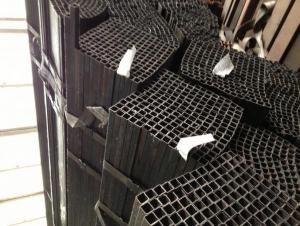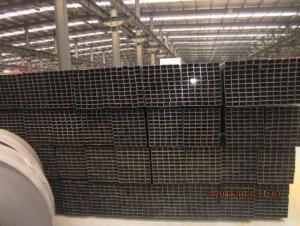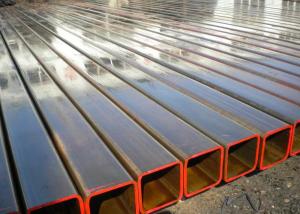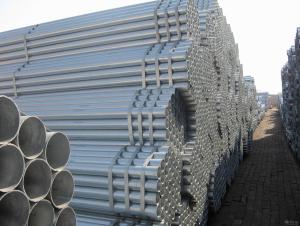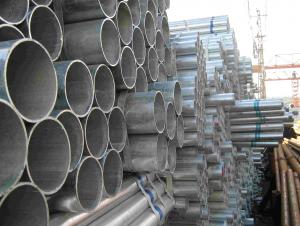High Quality Hollow Section-Square Tubes
- Loading Port:
- China main port
- Payment Terms:
- TT or L/C
- Min Order Qty:
- 5 m.t.
- Supply Capability:
- 1000 m.t./month
OKorder Service Pledge
OKorder Financial Service
You Might Also Like
High Quality Hollow Section-Square Tubes
Product Applications:
It is widely used in building, machine, chemical equipment, automobile industrial, container, it is also applied to agriculture and mine machine.
Product Specifications:
Standards: ASTM A500, GB6728
Grade: ASTM A500: A, B, C; GB6728: Q195, Q215, Q235, Q345
Sizes:
*Remark: Besides below sizes, we also can arrange production based on requirement of customers
Size (mm) | Thickness (mm) |
20×10 | 0.6-1.0 |
25×12 | 0.6-1.0 |
38×19 | 0.6-1.5 |
50×25 | 0.6-1.5 |
50×30 | 1.6-3.0 |
60×40 | 1.5-3.5 |
75×50 | 1.5-4.0 |
80×40 | 1.5-4.0 |
100×50 | 2.0-6.0 |
100×60 | 2.0-6.0 |
100×75 | 2.0-6.0 |
120×60 | 3.0-6.0 |
120×80 | 3.0-6.0 |
125×50 | 3.0-6.0 |
125×75 | 3.0-6.0 |
150×50 | 3.0-6.0 |
150×75 | 3.0-6.0 |
150×100 | 4.0-12 |
160×80 | 4.0-6.0 |
175×100 | 4.0-12 |
200×100 | 4.0-12 |
200×150 | 4.0-12 |
250×150 | 5.0-12 |
300×200 | 5.0-12 |
400×200 | 5.0-12 |
Chemical Composition:
Chemical Requirement | ||||
| Composition % | |||
| Grade A | Grade B | ||
| Heat | Product | Heat | Product |
Element | analysis | analysis | analysis | analysis |
Carbon max | 0.26 | 0.3 | 0.22 | 0.26 |
Manganese max | … | … | 1.4 | 1.45 |
Phosphorus, max | 0.035 | 0.045 | 0.03 | 0.04 |
Sulfur max | 0.035 | 0.045 | 0.02 | 0.03 |
Copper, when copper steel is specified, min | 0.2 | 0.18 | 0.2 | 0.18 |
Where an ellipsis (...)appears in this table, there is no requirement | ||||
For each reduction of 0.01 percentage point below the specified maximum for carton, and increase of 0.06 percentage point above the specified maximum for manganese is permitted, up to a maximum of 1.50% by heat analysis and 1.6% by product analysis | ||||
Mechanical Properties:
Tensile Requirement | ||
| Grade A | Grade B |
Tensile strength, min, psi (Mpa) | 48000 (400) | 70000 (483) |
Yield strength, min, psi (Mpa) | 36000 (250) | 50000 (345) |
Elongation in 2 in. (50.8mm), min, % | 23 | 23 |
GB6728:
Steel Grade | CHEMICAL COMPOSITION | MECHANICAL PROPERTIES | ||||||
C (%) | Si (%) | Mn (%) | P (%) Max | S (%) Max | YS (Mpa) Min | TS (Mpa) Min | El (%) Min | |
Q195 | 0.06-0.012 | 0.3 | 0.25-0.5 | 0.45 | 0.5 | 195 | 315 | 22 |
Q215 | 0.09-0.15 | 0.3 | 0.25-0.55 | 0.45 | 0.5 | 215 | 335 | 22 |
Q235 | 0.12-0.22 | 0.3 | 0.3-0.7 | 0.45 | 0.45 | 235 | 375 | 20 |
Q345 | 0.20 | 0.55 | 1.0-1.6 | 0.45 | 0.45 | 345 | 510 | 21 |
Packaging: Packed in bundles, each bundle with 6-8 steel stripes and 2 nylon strips or one by one Or Nested into Containers
Product Images:
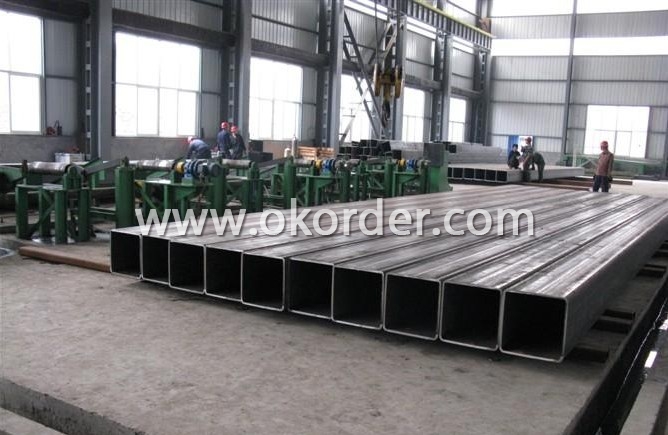
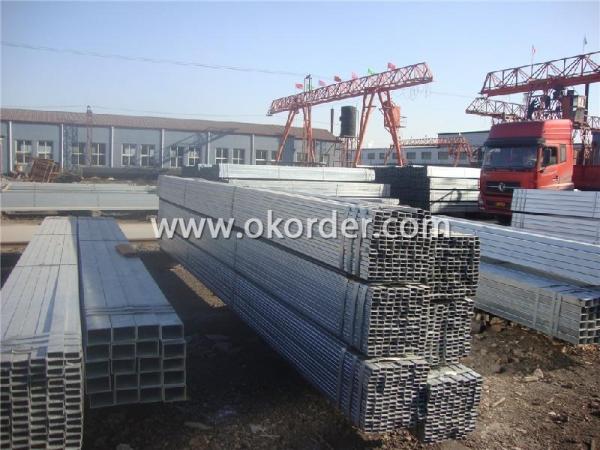
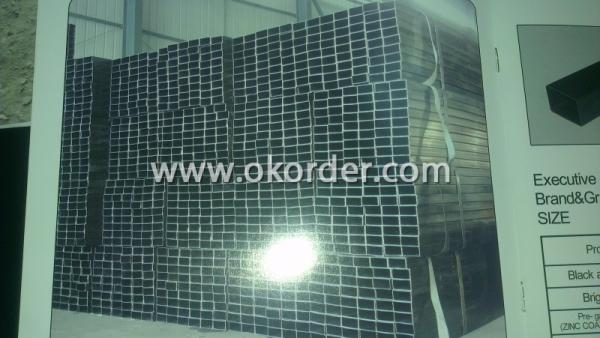
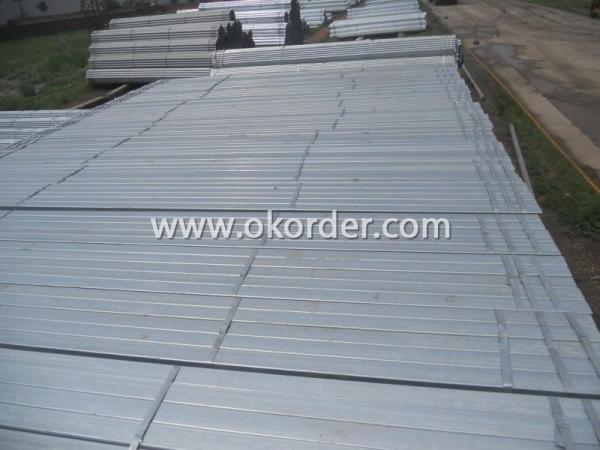
FAQ:
Q1: Why buy Materials & Equipment from OKorder.com?
A1: All products offered byOKorder.com are carefully selected from China's most reliable manufacturing enterprises. Through its ISO certifications, OKorder.com adheres to the highest standards and a commitment to supply chain safety and customer satisfaction.
Q2: How do we guarantee the quality of our products?
A2: We have established an advanced quality management system which conducts strict quality tests at every step, from raw materials to the final product. At the same time, we provide extensive follow-up service assurances as required.
Q3: How soon can we receive the product after purchase?
A3: Within three days of placing an order, we will begin production. The specific shipping date is dependent upon international and government factors, but is typically 7 to 10 workdays.
Q4: What makes stainless steel stainless?
A4: Stainless steel must contain at least 10.5 % chromium. It is this element that reacts with the oxygen in the air to form a complex chrome-oxide surface layer that is invisible but strong enough to prevent further oxygen from "staining" (rusting) the surface. Higher levels of chromium and the addition of other alloying elements such as nickel and molybdenum enhance this surface layer and improve the corrosion resistance of the stainless material.
Q5: Can stainless steel rust?
A5: Stainless does not "rust" as you think of regular steel rusting with a red oxide on the surface that flakes off. If you see red rust it is probably due to some iron particles that have contaminated the surface of the stainless steel and it is these iron particles that are rusting. Look at the source of the rusting and see if you can remove it from the surface.
Q6: What is the difference between galvanized steel and galvalume steel?
A6: Galvanized steel is metallic coated with Zinc in various coating weights. Minimum recommended for painted metal roofs is G90. Galvalume is a zinc and aluminum coated steel that becomes an alloy and is recommended in either painted or bare applications with a minimum coating weight of AZ50. Galvalume has an excellent performance life in bare exposures. Hence if you are using a bare panel use galvalume and if painted use either.
Q7: Is there a difference in thermal conductivity between stainless steel and steel?
A6: Yes. Stainless Steel has a lower thermal conductivity rate than steel; approximately 1/3 to 1/5th depending on the material.
Q8: Is there a difference in electrical conductivity between stainless steel and steel?
A8: Yes. Steel is generally more conductive than stainless steel. Steel has resistivity in the range of 10~20Ωm, while stainless has a resistivity of approximately 60~72Ωm.
- Q:Can steel pipes be bent or curved?
- Yes, steel pipes can be bent or curved using specialized equipment and techniques such as pipe bending machines or hydraulic bending.
- Q:Are steel pipes suitable for underground irrigation pumping?
- Yes, steel pipes are generally suitable for underground irrigation pumping. They are durable, resistant to corrosion, and can withstand high pressure. Additionally, steel pipes provide excellent flow capacity, ensuring efficient water distribution for irrigation purposes.
- Q:How are steel pipes used in the construction of oil and gas pipelines?
- Steel pipes are commonly used in the construction of oil and gas pipelines due to their strength, durability, and resistance to corrosion. These pipes are primarily used for transporting oil and gas over long distances, ensuring a reliable and efficient flow of these resources. The steel pipes are welded together to form a continuous pipeline that can withstand high pressure and extreme weather conditions. Additionally, their smooth interior surface minimizes friction and allows for efficient transportation of oil and gas.
- Q:How are steel pipes used in the manufacturing of telecommunications infrastructure?
- Steel pipes are commonly used in the manufacturing of telecommunications infrastructure for various purposes such as underground cable protection, overhead cable support, and antenna mounting. They provide durability, strength, and corrosion resistance, ensuring the longevity and reliability of the infrastructure. Additionally, steel pipes allow for easy installation and maintenance of telecommunications equipment, making them an essential component in the industry.
- Q:How do steel pipes handle ground settlement?
- One possible alternative: Due to their robustness and durability, steel pipes are highly suitable for managing ground settlement. The pipes' flexibility and strength enable them to endure the shifting and settling of the ground with minimal damage. Their high resistance to deformation ensures that they can maintain their shape and structural integrity even when the ground settles or moves. When the ground settles, steel pipes can flex and bend slightly to accommodate the movement. This flexibility allows them to adapt to changes in the ground without experiencing breakage or cracking. Additionally, steel pipes often incorporate joints designed to absorb and distribute stress caused by ground settlement. Moreover, steel pipes possess a smooth interior surface that reduces friction and resistance to material flow. This characteristic becomes particularly crucial when the ground settles, as it diminishes the chances of blockages or clogs due to debris or sediment settling inside the pipes. In conclusion, steel pipes possess the necessary strength, flexibility, and resistance to deformation to effectively handle ground settlement. They can adapt to ground movement without compromising their structural integrity, making them a dependable choice for various applications such as underground infrastructure and pipeline systems.
- Q:What are the different types of connections used with steel pipes?
- There are several types of connections commonly used with steel pipes, including threaded connections, welded connections, flanged connections, and grooved connections.
- Q:What is the difference between carbon steel and cast iron pipes?
- The main difference between carbon steel and cast iron pipes lies in their composition and manufacturing processes. Carbon steel pipes are made from an alloy of iron and carbon, with additional elements such as manganese and silicon added for specific properties. They are typically stronger and more durable, making them suitable for high-pressure and heavy-duty applications. On the other hand, cast iron pipes are made by melting iron and pouring it into molds, resulting in a more brittle and less flexible material. Cast iron pipes are commonly used for drainage and sewage systems due to their corrosion resistance and sound insulation properties.
- Q:What are the potential health hazards associated with steel pipe installation?
- Some potential health hazards associated with steel pipe installation include exposure to hazardous chemicals used in the coating or treatment of the pipes, inhalation of dust or fumes generated during cutting or welding, and physical injuries due to accidents or mishandling of heavy equipment. Additionally, improper handling or disposal of waste materials and contaminated water can pose environmental health risks. It is important to follow proper safety protocols, use personal protective equipment, and ensure proper ventilation and waste management to mitigate these hazards.
- Q:Are steel pipes suitable for underground oil pipelines?
- Yes, steel pipes are suitable for underground oil pipelines. Steel pipes are commonly used in underground oil pipelines due to their durability, strength, and resistance to corrosion, making them a reliable choice for transporting oil over long distances. Additionally, steel pipes can withstand high pressure and extreme temperatures, ensuring the safe and efficient transport of oil underground.
- Q:How do you transport steel pipes safely?
- Steel pipes can be transported safely by properly securing them using appropriate restraints, such as straps or chains, to prevent shifting or movement during transit. Additionally, using suitable equipment and vehicles, such as flatbed trucks or trailers, with adequate support and cushioning, can help ensure the safe transportation of steel pipes. Regular inspections of the securing arrangements and adherence to relevant safety regulations are also crucial to maintain the safe transport of steel pipes.
1. Manufacturer Overview |
|
|---|---|
| Location | Hebei, China |
| Year Established | 1988 |
| Annual Output Value | Above One Hundred Million RMB |
| Main Markets | Main land; Southeast Asia; Middle East; Africa |
| Company Certifications | ISO 9002:2010;API 5L |
2. Manufacturer Certificates |
|
|---|---|
| a) Certification Name | |
| Range | |
| Reference | |
| Validity Period | |
3. Manufacturer Capability |
|
|---|---|
| a)Trade Capacity | |
| Nearest Port | Tianjin |
| Export Percentage | 30%-50% |
| No.of Employees in Trade Department | 201-500 People |
| Language Spoken: | English; Chinese |
| b)Factory Information | |
| Factory Size: | 50,000 square meters |
| No. of Production Lines | Above 15 |
| Contract Manufacturing | Meicai Metal Trading Co.Ltd |
| Product Price Range | Average |
Send your message to us
High Quality Hollow Section-Square Tubes
- Loading Port:
- China main port
- Payment Terms:
- TT or L/C
- Min Order Qty:
- 5 m.t.
- Supply Capability:
- 1000 m.t./month
OKorder Service Pledge
OKorder Financial Service
Similar products
New products
Hot products
Hot Searches
Related keywords
